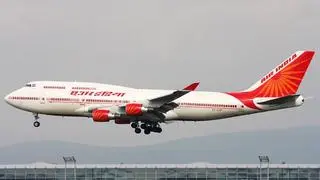Aviation’s contribution to man-made greenhouse gas emissions is between 2 per cent and 3 per cent.
If no action is taken, with the expected growth in global air traffic, aviation’s contribution towards greenhouse gas emissions will increase over the coming decades. To avoid air traffic growth contributing to an increase in CO2 emissions, the aviation industry was the first sector to define long-term reduction targets and to set up a global carbon offsetting scheme within the framework of the International Civil Aviation Organization (ICAO).
Reaching high
The aviation industry has the ambition of net-zero carbon emissions by 2050. Air France – KLM Group is committed to this ambition and in 2008, we introduced our first Climate Action Plan to reduce our carbon footprint. In 2019, we tightened ambitions and set ourselves targets for 2030. The group’s sustainability strategy is structured around the following, for which targets have been identified and action plans implemented
Fleet renewal is an important step towards reducing the carbon footprint — modernising and renewing the fleet with latest generation aircraft technology which translates to lower fuel consumption and CO2 emissions (Boeing 787, Airbus A350 and A220, Embraer 195-E2) and by phasing out older aircraft (Airbus A380 and A340, Boeing 747). For example, the Airbus A350s consume 25 per cent less fuel than the equivalent aircraft of the previous generation, thanks to the incorporation of lighter materials, composites and titanium. Its noise footprint is also reduced by 40 per cent. Air France operates this equipment on the India-Paris route.
Replacing conventional jet fuel with Sustainable Aviation Fuels (SAF) is the most impactful means of reducing our carbon footprint, it is four to eight times more expensive than fossil fuel and not yet available on a large scale. SAF is jet fuel, made from renewable sources like used cooking oil and a durable substitute to fossil fuel. SAF proactively reduces emissions by at least 75 per cent compared to fossil fuel, and it contributes to a circular economy. Today, less than 0.1 per cent of the roughly 300 million tonnes of jet fuel used by commercial airlines is SAF. To make a significant impact on aviation’s overall carbon emissions, we need to accelerate the demand for SAF.
In 2021, Air France–KLM launched the “Sustainable Aviation Fuel” programme dedicated to corporate customers. Our corporate customers after an estimate of the CO₂ emissions associated with their travel can determine an annual contribution they wish to devote to the Corporate SAF (Sustainable Aviation Fuel) programme. In 2021, globally 48 customers joined the Air France-KLM SAF corporate programme, which is further proof of a strong commitment leading to concrete actions.
The writer is General Manager Indian Sub-Continent, Air France-KLM.







Comments
Comments have to be in English, and in full sentences. They cannot be abusive or personal. Please abide by our community guidelines for posting your comments.
We have migrated to a new commenting platform. If you are already a registered user of TheHindu Businessline and logged in, you may continue to engage with our articles. If you do not have an account please register and login to post comments. Users can access their older comments by logging into their accounts on Vuukle.